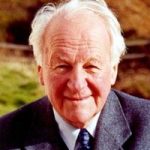 Every year avid readers publish their lists of favorite reads and I too look forward to sharing my list. As I have reviewed the 80+ books I’ve read this year, I decided to write a separate post on Best Author before listing my best books, since about 10 of the books I read were by John Stott.
Every year avid readers publish their lists of favorite reads and I too look forward to sharing my list. As I have reviewed the 80+ books I’ve read this year, I decided to write a separate post on Best Author before listing my best books, since about 10 of the books I read were by John Stott.
Honoring him is especially appropriate since this is the centenary of John Stott’s birth on April 27, 1921. Others have been honoring his legacy with special lectures and events, and this is my small contribution.
My attraction to Stott’s works this year started with listening to Balanced Christianity. This small book discusses some of the tensions within the faith and how we need to hold them in balance rather than pitting them against each other. While written in 1975, Stott’s pastoral and gracious approach to potentially divisive topics seemed particularly relevant in our current season of conflict and polarization.
In Balanced Christianity, Stott addresses four conflicts and how to navigate them:
Intellect vs. Emotion. Stott warns against the enthronement of experience as the criterion of truth. Biblical truth should always judge experience not the other way around. On the other hand, Stott finds a dry and lifeless orthodoxy equally dangerous, and to deny emotions as perilous as denying your intellect. We need what Martyn Lloyd-Jones famously called “logic on fire.”
Conservative vs. Radical. Stott defines conservatives as those who want to preserve the past and resist change and radicals as those who reject the past and want to move on. We are called to be conservative in “guarding the deposit” of faith (1 Timothy 6:20). But we are also called to model our lives on Christ, who swept aside the traditions of the elders and freely violated social conventions. So obedience calls us to discern truth that must not be changed and culture and conventions that may and should be changed.
Form vs. Freedom. Many Christians desire worship services that are free, flexible, and spontaneous without a set liturgy and they prefer churches that are independent of denominational ties. But Stott encourages us to see the value in defined orders of service and established relationships among churches in fellowship. Stott finds a necessary place in the church for both the structured and the unstructured, the formal and the informal, the dignified and the spontaneous, independency and communion.
Evangelism vs. Social Action. Evangelicals are known by their emphasis on evangelism: sharing the good news of salvation. But they are also often known as people who isolate themselves from addressing the causes of brokenness in the world. On the other hand, some Christians stress social, economic, and political efforts to the point that a relationship with Christ is ignored. For Stott, loving one’s neighbor as oneself should mean that we are concerned for their total welfare: bodies, souls, and spirits.
I was drawn by the wisdom in this book to pursue other writings by Stott, and went on to read seven of his commentaries, part of the Bible Speaks Today series. I found these commentaries to be written at exactly the level that I need. Stott is certainly intellectually well qualified, but he does not write as an academic, although some discussion definitely strained my ability to follow. Stott’s approach is pastoral: he really wants people to understand what the book is saying. You can’t help but feel like he is shepherding you through the text: pointing how the word can feed your faith, warning where pitfalls may exist in interpretation, encouraging you to linger in rest on deep and glorious truths.
I’m not going to put all seven of Stott’s commentaries on my best of 2021 list, but I do want to highlight his substantial impact on my reading this year and recommend anything he has written. Here are the ones I read: Reading the Sermon on the Mount, The Message of Romans, The Message of Ephesians, The Message of 1 and 2 Thessalonians, The Message of 1 Timothy and Titus, The Message of 2 Timothy, The Letters of John.


0 Comments